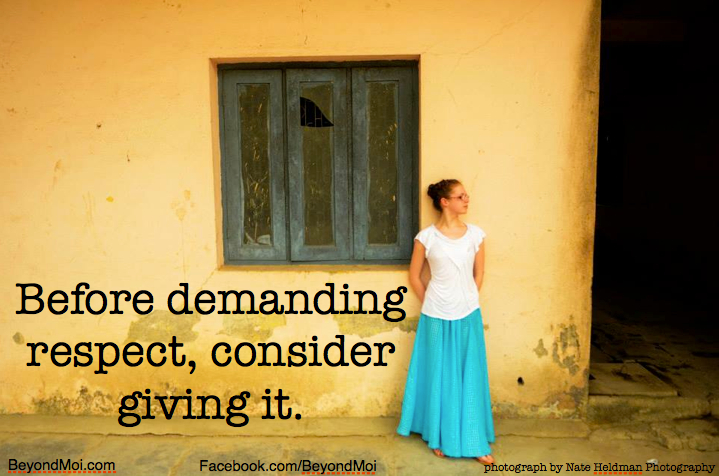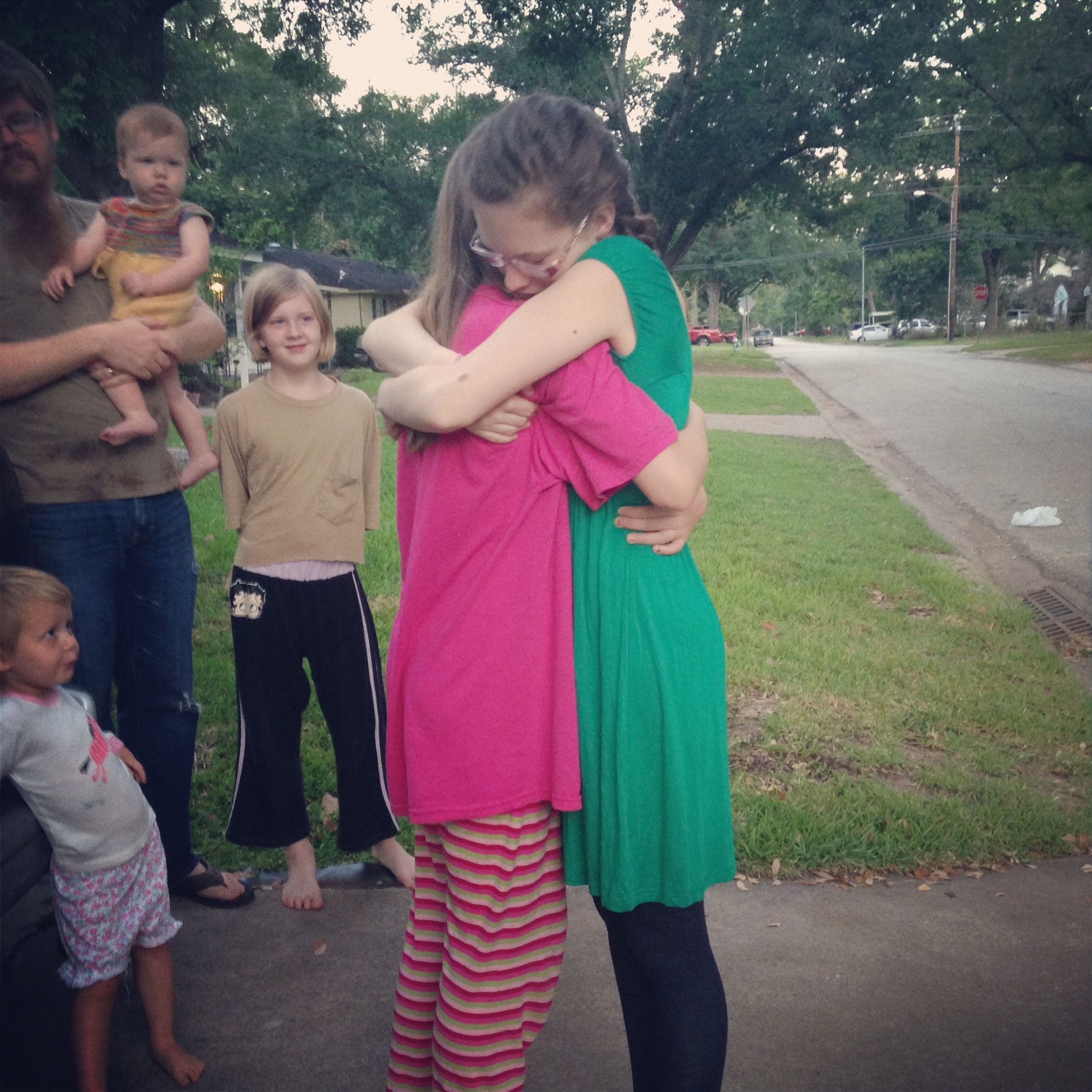 A man—a stranger—promises ice cream to a 7-8 yr old. She just needs to leave the school grounds and come with him. He grabs hold of her clothing. She refuses to go. He pushes her to the ground. She escapes with a minor scrape. She tells no one at school. But she relays the story to her parents that evening, who then start an email conversation with other school parents, who then urge them to notify the school. The advice is followed and the school calls the police the next day. The police determine that it is most likely all a fabrication, a story that the young girl made up. The school administration explains to the parents how the circumstances of the story don’t add up (like the school gate being closed, and there being a notable number of adults and teachers present at the time).
A man—a stranger—promises ice cream to a 7-8 yr old. She just needs to leave the school grounds and come with him. He grabs hold of her clothing. She refuses to go. He pushes her to the ground. She escapes with a minor scrape. She tells no one at school. But she relays the story to her parents that evening, who then start an email conversation with other school parents, who then urge them to notify the school. The advice is followed and the school calls the police the next day. The police determine that it is most likely all a fabrication, a story that the young girl made up. The school administration explains to the parents how the circumstances of the story don’t add up (like the school gate being closed, and there being a notable number of adults and teachers present at the time).
There isn’t much else to this story, but it does raise a lot of questions for Jessica and me as parents to our own 7 yr old.
First, and most importantly, I’m really glad that the girl is unharmed, and that we can still consider our school to be a safe place for our children. Also, the school administration is to be applauded for their handling of this situation.
If the story is true, why didn’t the 7 yr old tell her teacher immediately? Or any other person of authority in the school? Or a classmate? Why did she wait to tell her parents that night? What is it that made her feel unsafe? If it isn’t true, why did she make it up? Was she trying to cover up for her own embarrassment over accidentally hurting herself when she tripped and fell? Was she covering up for a classmate?
Whether the story is true or not, why didn’t the parents report this to the school as soon as they found out about it? What does this say about their trust of the school? Or perhaps people in positions of authority in general?
Are we sure that our own 7 yr old would know what to do and have the confidence to do it if she actually faced a similar situation?
Jessica and I believe it’s time for us to have a conversation with our kids that we have with them every 9 months or so; one about choices, who they are, and unconditional love. And safety, of course.
And the above story will help set it up.
We’ll discuss why we think the girl may have made up the story. And then we will ask some follow-up questions:
- do you think it was a good idea for the girl to make up that story about a stranger offering her ice cream?
- what should you do if someone you don’t know says you can have ice cream if you will just go somewhere with them?
- what if they say you can have some candy if you just get in a car with them? Or help them find their lost puppy?
At this point we, the parents, make it very clear to them that there are people in the world that try to trick children so they can take them away from their parents. We talk about tricky people and our tummy voice that can warn us when something isn’t right. Then we review who our safe people are.
Who are safe people?
- Mommy
- Daddy
- Big Sisters/Designated family
- Designated neighbors
- Designated friends (by name AND face)
- Police Officers and Firefighters
- Other moms/dads with kids- the more kids they have with them, the better
- In an emergency, anyone big enough to help that doesn’t trigger tummy voices
We describe possible situations.
Some people may offer you candy, or chocolate, or ice cream, or a toy, or a chance to see some cute little kittens, so that you will go with them and they can then trap you and take you away. That is why you should always check with your mommy and daddy or someone else you know is a safe person you can trust like your teacher or your big sisters if they are taking care of you if someone you don’t know wants to give you a treat, or go with them somewhere. To make it easier, let’s say that if anyone wants to give you a treat, or go somewhere with them, you should always tell them that you have to ask your safe people first, ok? Who are your safe people? (We list them together.) Let’s practice what we would do if someone you don’t know wants to give you a treat to go with them.
Let’s pretend that your big sister Lolie takes you to the park to play, and a woman comes to you and says with a big smile: “Hi! You’re so cute! Do you like candy? I have candy for you in my car. Let’s go get it together!”
We role play until we’re satisfied with their answers.
You are strong, and brave, and you already know that no one is allowed to do things to your body or force you to do things without your permission. If someone (even people you know and love) ever tries to do something to you that you don’t want them to do, what are some things that you can do?
In our family, the list looks something like this, in order:
- Tell them no, stop, you don’t like it.
- Ask for help from a person you trust, a safe person. If you can’t get to one or if they don’t listen:
- Scream fire
- Fight back. If those don’t work, you can fight back; you can punch them, kick them, bite them, scratch them, pull their hair, and yes, even kick them in the penis or vulva—anything you need to be free and safe again.
To be clear, because we are aware and experienced with the reality that those that abuse children are most likely familiar to the victim, these guidelines apply not only to strange tricky people, but even to people we know and love. Which means, yes, at times these methods are used between siblings.
If you are at school when something happens that makes you scared or uncomfortable, or even hurts you, who are some safe people that you can find to ask for help? It’s really important that you tell those safe people exactly what happened, even if it makes you scared or uncomfortable. This is important so that those safe people can help you and anyone else in the best way. Do you think you could do that?
What if we’re somewhere else, like the zoo? Who are some safe people there?
What about when you are at home?
Once we run out of answers, we will address the whole group and stress the importance that we all remain safe people for each other. We mention how important it is that we respect each other’s boundaries all the time, otherwise we risk not being seen as a safe person anymore.
 Do you want to be a safe person for your sisters? Mommy and I take this very seriously and if you don’t feel safe around us, tell us, because we want you to feel safe with us. We want you to feel like you could tell us anything without being afraid. You can tell us anything, even the things you do that may disappoint us and we will not get angry.
Do you want to be a safe person for your sisters? Mommy and I take this very seriously and if you don’t feel safe around us, tell us, because we want you to feel safe with us. We want you to feel like you could tell us anything without being afraid. You can tell us anything, even the things you do that may disappoint us and we will not get angry.
(Parents, this is the part of the conversation where we need to ask ourselves if the way we react to things our children tell us could lead to them being afraid of how we react to things in the future. If we want them to feel safe enough to tell us about an embarrassing story, about being mistreated by someone, about being sexually assaulted by someone, them mistreating someone, or them doing something that may be wrong, we need to be prepared for how we will react to that. For us, it is an intentional setting aside of our own feelings to tend to theirs first, because they are the hurting, they are the frightened, they are the victims; and we are their support. Any anger we have, any hurt we feel, in response to what they tell us needs to be controlled and dealt with later, or we risk frightening our children and causing them to want to protect our feelings in the future.)
Is there anything that Mommy and I do that make you feel like you’re not safe with us? Or maybe that makes you feel like there are some things that you shouldn’t tell us? (a note here to parents: stop discouraging tattle-telling. If your child has conflict with another child, it simply isn’t fair for you to assume that they are mature enough to solve their own problems. When they come to “tattle” welcome them and offer to help them. If you demonstrate that they can trust you with those struggles, it will set the groundwork for them to trust you with much deeper struggles.)
We are specific about how there is nothing our children could do that would end our love for them. Ever. It is not enough for a child to be told that they are loved no matter what, they don’t grasp this concept and sometimes we unintentionally communicate that our love is conditional with our reactions to their behavior and feelings. To help our children understand, we set out scenarios:
Did you know that we love you no matter what?
Would we still love you if you lied to us?
Would we still love you if you broke a plate on accident?
What if you did it on purpose? Would we still love you then?
Would we still love you if you told us you hated us?
Would we still love you if you took our favorite thing and smashed it with a hammer? Like, maybe, Daddy’s wedding ring?
Would we still love you if you stole something?
Would we still love you if you hurt someone really bad on accident?
Would we still love you if you hurt someone on purpose?
What if you killed someone, would we still love you then?
What if, because of some bad things that you did, you got locked up in prison? Would we still love you then?
This is a conversation, so several of these actually take a little time to work through, and that’s important. This is when we get to impress upon them that doing a bad thing doesn’t make them a bad person. We can still love them even when they make bad choices, because their bad choices don’t make them bad people. We are disappointed when they make bad choices, but we aren’t disappointed in who they are. SquiggleBug, when you do a bad thing, it doesn’t mean that you are a bad SquiggleBug. We can be sad that you did that bad thing and still love you, because you are still a good person. (It should be noted that those who believe that people are inherently evil will probably not be able to say this. I would challenge them to reconsider their view on this. I have changed mine and the world makes a lot more sense to me now that I believe that people are inherently good—this does not mean perfect—and need guidance with the choices they face.) This is incredibly important. We learned from the sexual abuse of two of our children that their abuser convinced them they were bad and that we, their parents, wouldn’t love them if they were bad. This strategy is used by many abusers to silence their victims.
We have been asked what would happen to a person if they kept making bad choices. Would that make them a bad person? Our answer has been to say that if a person keeps making bad choices, then they get used to making bad choices and may forget how to make good choices. They still aren’t bad people, but they may seem that way because they don’t know how to make good choices anymore. It takes lots of practice to keep making good choices.
Is there anything that you can think of that you could do that would make us stop loving you?
(spoiler: they can’t, because there isn’t anything).
The goal of this conversation is to establish ourselves as people who love and value our children no matter what, and because of it, we also establish ourselves as safe people that they can trust to talk about anything and everything. Not only does this increase their degree of safety, but it also makes for the possibility of a deep and trusting friendship with them in the long-run.
~ Jeremy
Jeremy Martin-Weber is the proud father of 6 inspiring girls, and is 19 years into a love story with his partner, Jessica Martin-Weber.









I love this! Thanks for for writing and sharing.
Thank you for helping me gather tools to help prevent my 2 year old daughter from going through what “I had to endure” for a long time as a child by the hands of my stepbrother and in my adult life by a stranger.
I never wanted to burden my mother as she had a lot to deal with from my sister. My father would have never believed me because of the wicked witch known as his wife, and he finally had a son, he could do no wrong in my father’s eyes.
I’ve been struggling trusting even family to watch my kid (no one of course knows my internal conflict) and how to raise her to never fear coming to me when someone else threaten her life if she tells.
This will surely help, so thank you.
No one should have to go through any form of abuse. I’m so sorry that you did. I don’t believe that we can completely prevent bad things from happening to our kids, but we can intentionally equip them to stand up for themselves and to know that they are not alone when bad things do happen. Living through abusive situations is bad enough, but doing so alone is so much more destructive. Let’s teach our kids that we are there for them no matter what. Another thing that we stress with our kids from time to time is that if anyone hurts our kids, they will be in serious trouble with us, their parents. Our kids won’t be in trouble, but the person who hurt our kids, or tried to, will be. And when it comes to protecting our kids, people better watch out. We might even beat them up. 🙂 Our kids are super impressed with that. ~ Jeremy
I wasn’t taught to stand up for myself, so I really was not equipped to teach that to my children. Heck, when my kids were small, I was still in the dark about where my own upbringing was lacking. Now I am a grandmother, and I am still learning about the workings of life, and diligently trying to unlearn years of misguided niceness. At the same time I am blessed to spend a lot of time with my grandchildren, and I very much appreciate tools like this to help me guide them. Thank you!
A very positive approach to something parents fear their children should never experience and I can see why those safe people would be very good to set out in advance.
Thank you for another great blog! This is a really good help to know where to start. My oldest is 2 and with all that I see in the news I’m starting to get scared to let her leave the house! I jest, but I don’t. She’s probably not ready for quite this much of a conversation, but she is big enough to start talking to.